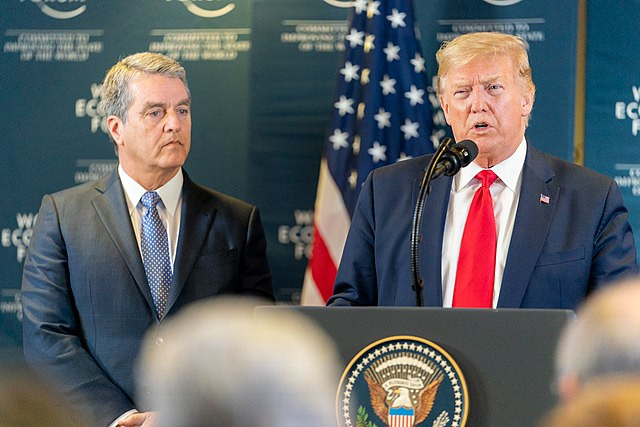In a bold and wide-ranging virtual address to the World Economic Forum (WEF) in Davos, Switzerland, President Donald Trump laid out an aggressive agenda targeting global trade practices, energy policies, and domestic regulatory frameworks. Speaking from the White House just four days into his term, Trump called on international businesses to invest in the United States while threatening tariffs on foreign goods and demanding lower interest rates from the Federal Reserve.
"My message to every business in the world is very simple: Come make your product in America and we'll give you among the lowest taxes of any nation on earth," Trump declared. "If you don't make your product in America, which is your prerogative, you will have to pay a tariff."
The speech, which lasted 45 minutes, was followed by a moderated discussion with global business leaders, including Blackstone CEO Steve Schwarzman, Bank of America Chairman Brian Moynihan, and TotalEnergies CEO Patrick Pouyanné. Trump used the platform to emphasize his vision of the U.S. as a global economic powerhouse and criticized foreign nations for what he described as unfair trade practices.
"We just want to be treated fairly with other nations," Trump said, claiming "there's hardly a nation in the world" that isn't "tak[ing] advantage of us, and we can't let that happen anymore."
Trump also took aim at European regulators, whom he accused of being too strict on U.S. tech companies, and expressed frustration with the European Union's trade policies. "They don't take our products and they don't take our cars," Trump said, adding that the EU's value-added tax (VAT) creates an uneven playing field.
Oil prices and energy policies were another key focus of Trump's speech. The president blamed OPEC for keeping oil prices high and suggested that a drop in prices could lead to a resolution of the ongoing war between Russia and Ukraine. "If the price came down, the Russia-Ukraine war would end immediately," Trump claimed, reiterating his desire to meet with Russian President Vladimir Putin to negotiate an end to the conflict.
"I would really like to meet with President Putin soon and get that war ended," he added. "It's a carnage and we really have to stop that war."
While expressing optimism about Ukraine's willingness to negotiate, Trump placed the onus on Putin to make the next move, saying, "Ukraine is ready to make a deal."
On the domestic front, Trump outlined plans to boost U.S. oil and gas production, which he claimed would lower costs for consumers and solidify America's status as a manufacturing leader. "The United States has the largest amount of oil and gas of any country on Earth, and we're going to use it," he said. "Not only will this reduce the cost of virtually all goods and services, it will make the United States a manufacturing superpower, and the world capital of artificial intelligence and crypto."
Trump's remarks also included pointed criticism of the Federal Reserve, with a call for immediate interest rate cuts. "I'll demand that interest rates drop immediately," Trump said, signaling his intention to challenge the Fed's independence and its chairman, Jerome Powell.
In a sharp pivot, Trump addressed domestic policy initiatives, touting his executive orders aimed at dismantling diversity, equity, and inclusion (DEI) programs in the federal government. "My administration has taken action to abolish all discriminatory Diversity Equity and Inclusion nonsense ... policies that were absolute nonsense throughout the government and the private sector," he said. "America will once again become a merit-based country."
The president also took credit for what he described as unprecedented achievements in his first days in office. "We have accomplished more in four days ... than other administrations have in four years," Trump boasted, citing the U.S. withdrawal from the Paris Climate Agreement, the reversal of clean energy initiatives, and moves to assert control over the Panama Canal as examples of his administration's decisive action.
Trump's appearance at Davos came against the backdrop of renewed U.S. withdrawal from multilateral agreements and strained relationships with allies. The president reiterated his previous controversial proposal to "buy" Greenland and hinted at potential new tariffs on products from Mexico, Canada, and China.






